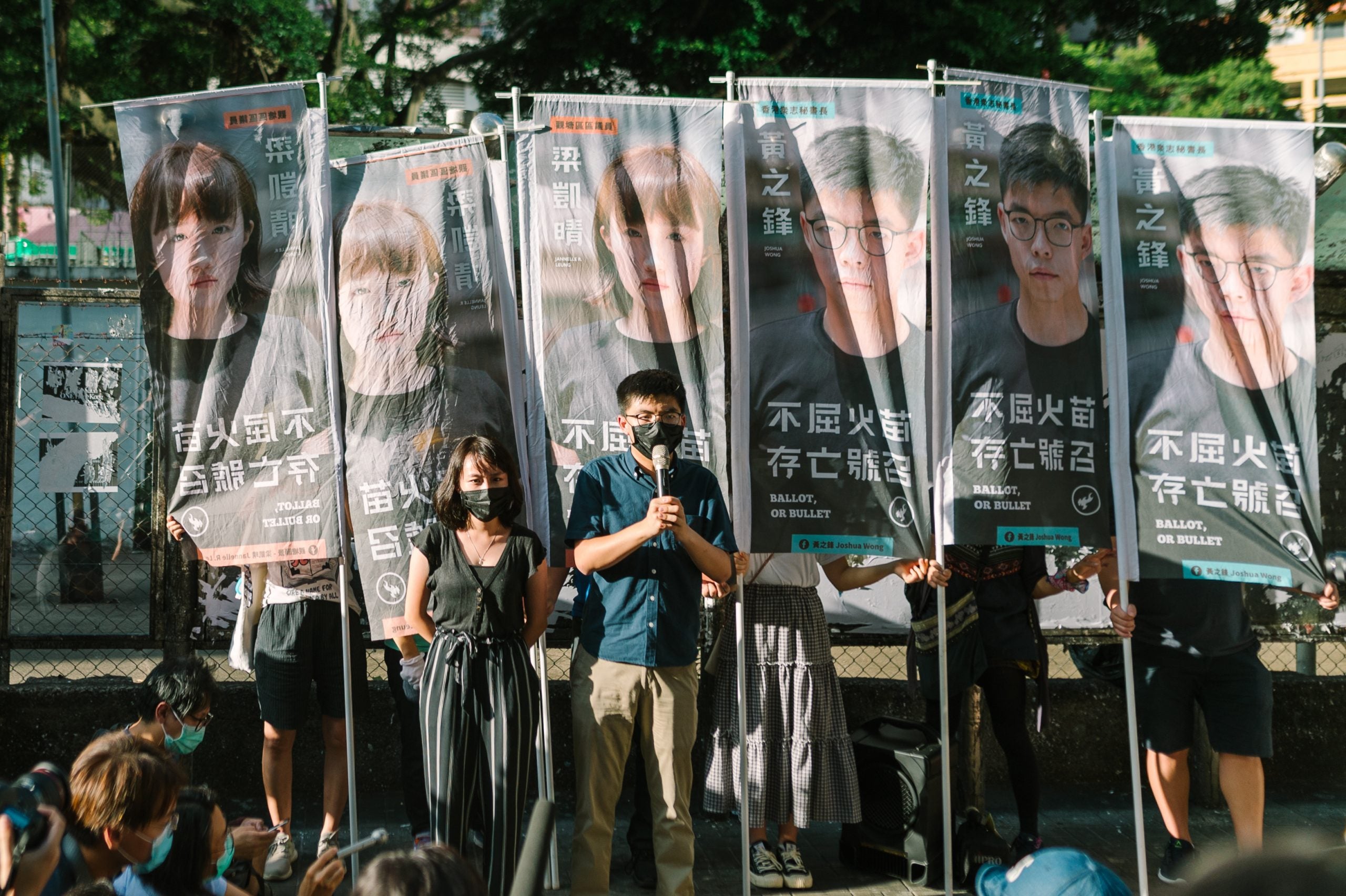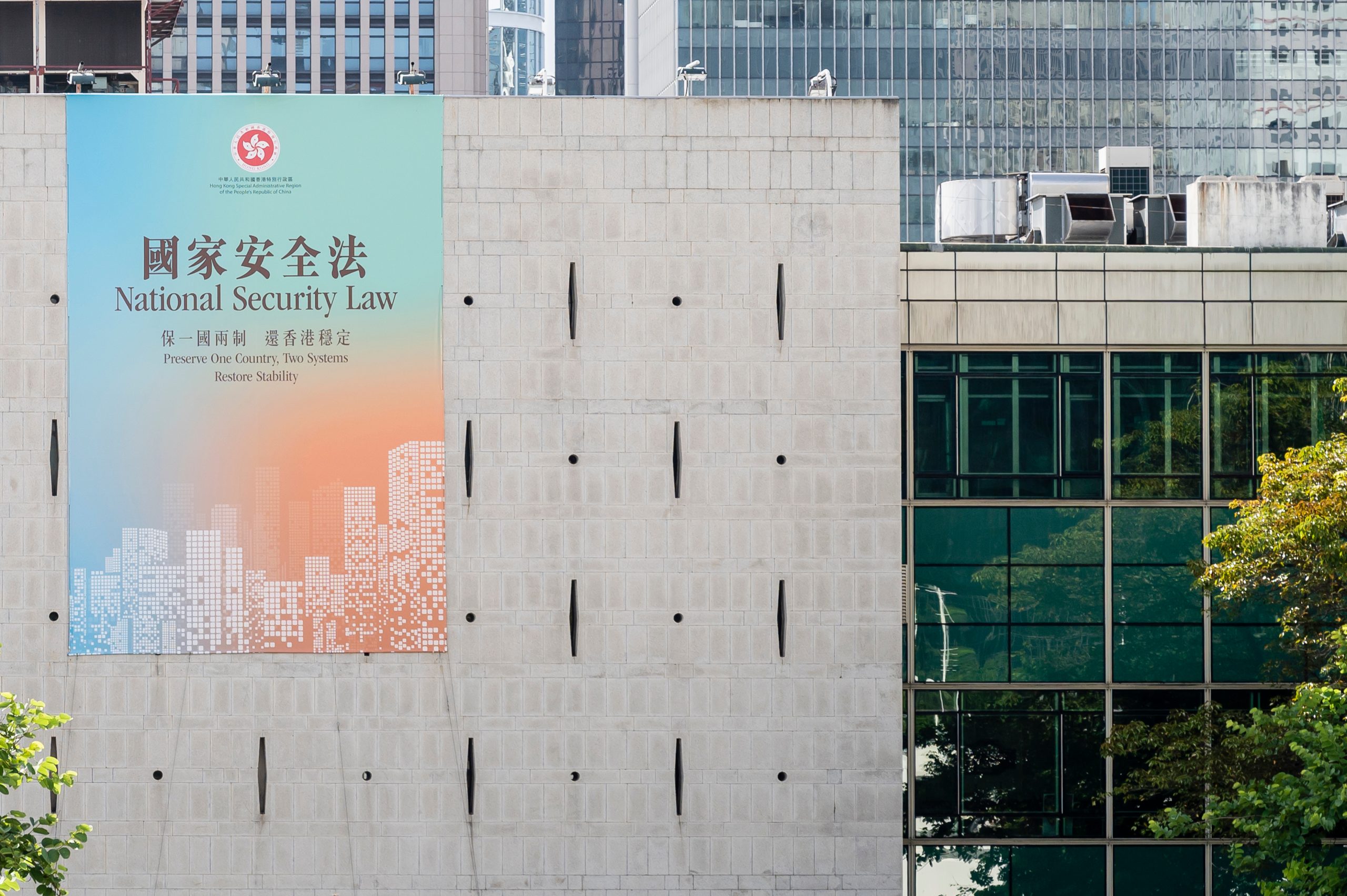Youth Politics in the Time of Pandemic: A View from Asian Cities
Sonia Lam-Knott and Yi’En Cheng, 3 September, 2020

Hong Kong,China - June 19 2020: Joshua Wong announced to join the 2020 Hong Kong pro-democracy primaries in Kwun Tong MTR Station
Shortly after the ‘Youth Politics in Urban Asia’ Special Issue was published in Space and Polity in March 2020, the COVID-19 pandemic assumed a global scope and induced drastic changes across all societies. Cities have been especially affected by the pandemic.
States have forced their urban citizens to vacate the streets and other public spaces and to become compliant subjects of new technologies of control and surveillance. Despite the coronavirus prompting an abrupt reconfiguration of state-society relationships, existing tensions and contestations continue to manifest, accompanied by the emergence of new socio-political dynamics and spatialities.
In the Special Issue, we argued for the need to contextualise youth politics within their urban realities, as well as demonstrated how cities serve as a multifaceted arena that can delegitimise young people as citizens, but also present opportunities and resources for young people to renegotiate constructs of citizenship and state-society relationships in urban governance. However, the spread of COVID-19, and the resultant lockdowns imposed across Asian cities, have disrupted and suspended some of these renegotiations, and catalysed the rapid reconfiguration of power across the region.
Six months into the pandemic, we have an opportunity to revisit - and reaffirm - the central premise and key arguments within the Special Issue. This piece reflects on the continued need to direct our critical attention towards youth politics in urban Asia in the time of COVID-19 and beyond, and to appreciate the ways in which youth politics are rapidly evolving with emergent political and economic considerations.
We will also contribute fresh insights about the pandemic’s impacts on urban governance and young people’s political lives in Asia, by illustrating how borders and migratory movements can provide a critical lens towards understanding youth politics during this contemporary confluence of global political, economic, and health crises.
Youth politics in urban Asia: pandemic impacts
Despite the variable successes and failures of Asian governments in managing the COVID-19 outbreak within their borders (Abuza, 2020), the pandemic has nonetheless reconfigured the economic and political realities of youths. Lockdown measures across different cities have forced young people to retreat from public spaces, thereby suspending their attempts to attain visibility and inclusion in their urban landscapes (Advani, 2020), and their efforts to contest power inequalities in urban governance on the streets (Ku, 2020; Lam-Knott, 2020).
The pandemic has also prompted the temporary closure of universities. Students are no longer able to access their campuses which served as ideological safe spaces, where they can experiment with different civic projects to create change (Cheng and Jacobs, 2020), and learn new political identities while bringing these ideas back to rural communities (Gergan and Smith, 2020).
The inability to access campus spaces allowing for the exploration of alternative discourses has stymied young female students’ attempts to challenge gender norms and reconfigure patriarchal dominance (Zahan, 2020), and students’ ability to question their neoliberal realities (Landgraf, 2020), in their respective localities. On a more pragmatic level, the inability of youths to resume and complete their education delays their entry into the job market.
The economic precarity of Asian youths has been compounded by the financial downturns caused by the pandemic, with the International Labour Organisation finding that young people in the Asia-Pacific region have lost twice as many working hours than the global average (Robinson 2020). The dearth of employment opportunities, combined with the inability of government relief programmes to alleviate these bleak prospects, evoked fears that this ‘lost generation’ of disenfranchised youth will lead to future political instability (Koh and Silvam, 2020).
The pandemic has also prompted young people to re-examine their relationship to their governments, and their role as citizens. For example, the Chinese government has silenced dissenting voices and censored media coverage pertaining to COVID-19, fueling mistrust and resentment towards the state amongst Chinese youths, who have subsequently launched online campaigns to raise money for medical workers (Wang and Hernández, 2020).
Responding to the Filipino government’s delayed efforts to close urban and national borders, its unwillingness to provide aid and necessities to residents of major urban areas, and its dissemination of misleading information (Beltran, 2020), youth-led enterprises are now working with local-level governments to stymie the spread of disinformation and provide services to help communities cope with the pandemic (UNDP, 2020). Similarly, widespread public dissatisfaction towards the Hong Kong government’s refusal to close the city’s border and inability to furnish frontline workers with protective equipment (Cheung and Wong, 2020), drove young people to mobilise and procure face masks for the urban poor.
Such youth actions take place in a wider context whereby quasi-democratic regimes in Asia are using the pandemic to secure more power and curtail citizen rights (Ratcliffe, 2020). In Thailand, the government arrested protesters for supposedly breaching an emergency decree designed to control the spread of COVID-19, prompting civil society actors to describe the decree as a ploy to suppress dissenting voices (Aljazeera, 2020). Likewise, the Philippine government arrested urban activists and the urban poor in Manila who have criticised the state, under the pretext of enforcing quarantine measures (Aspinwall, 2020).
The Hong Kong government has similarly made use of the pandemic to ban pro-democracy activities, arrest pro-democracy activists, and implement the National Security Law (NSL) which criminalises dissent against Hong Kong and Chinese authorities (Richardson, 2020). Faced with governments that refuse to redress - but instead suppresses - citizen concerns, young people in Asia have found a need to compensate for the shortcomings of their governments within an increasingly physically and ideologically constrictive political spaces of their cities.

Hong Kong - 10 August 2020: A poster for the National Security Law is seen in Hong Kong, China. Photo by Yu Chun Christopher Wong
The economic and political developments induced by COVID-19 present new uncertainties that add to already existing challenges regarding how young people are to be positioned within and beyond Asian cities. The pandemic has inhibited the ability of youths to move towards greater economic and political participation within their urban locales.
At the same time, it has also disrupted young people’s aspirations and actual ability to travel overseas for education and employment purposes, while forcing a segment of activist youths to participate in illicit and risky forms of mobility. Indeed, new complexities have been introduced to the current landscape of borders and migratory flows in which young people in Asia and beyond must now navigate through.
Borders and migrations: fresh insights
In the wake of the pandemic, international students have emerged as one of the hardest-hit segments of the youth. A large number of them have had their study visas suspended; host governments have compelled them to return home in order to alleviate pressure on local healthcare resources (Ross, 2020), and some have even been subjected to name-calling and physical attacks (Iau, 2020), which emphasised their foreign ‘outsider’ status in their host countries.
Such racialised encounters and restrictive responses of host governments contribute to the exacerbation of existing inequalities within global higher education markets. Yet, at the same time, counter-topographies have emerged. For instance, hundreds of Indonesian students launched online petitions to challenge the Taiwanese government’s decision to lift travel restrictions for students across Southeast Asia except for Indonesia (due to the Indonesian government’s inability to manage the mounting number of COVID-19 cases in their country) (Taiwan News, 2020).
Elsewhere, internationally mobile youths have also sought to challenge anti-Asian sentiments on their overseas campuses, utilised diasporic networks to kickstart online support communities, and took initiative to ameliorate supply shortages (for essentials such as masks) by establishing transnational shipping chains. These emergent forms of diasporic youth solidarities, networks, and mobilisations offer a glimpse of how care and mutuality can drive a new politics of hope.
But in some Asian locales, the pandemic has escalated geopolitical tensions to such a degree that there is now a generation of disenchanted youths who believe they no longer have a future in their cities. In stark contrast to the hopeful spaces that emerge from active mobilisations, these youths are driven towards disquieting forms of ‘escape mobilities’, to seek out new lives in places afar. We turn our gaze back to Hong Kong’s continuing urban unrest to trace some of these developments.
In the years prior to the pandemic, Hong Kong youths already expressed a desire to emigrate, in response to urban inequalities and the city’s loss of autonomy and civic freedoms throughout the 2000s (Leung, 2019). These migratory desires assumed a sense of urgency in November 2019, when the escalation of protest clashes resulted in police raids on university campuses and caused universities to cancel classes, prompting a cohort of young people to seek educational refuge abroad.
A handful of Hong Kong students have since abandoned their studies in the city and are seeking education and asylum in places such as Australia, Canada and Taiwan (Evlin, 2020; Lo and Chung, 2020). Other young people, especially activist youths who partook in street protests, are seeking emigration to avoid state persecution under the aforementioned NSL. Under these circumstances, emigration has been reframed as a response to mediate the trauma of political contentions in the city, while repositioning young people as exiles with temporary and precarious status in foreign places.
The NSL also provided a platform for new fissures to develop. Hong Kong’s contentious political landscape is forecast to produce a significant exodus of highly educated and skilled professionals, which several nations have sought to capitalise on, thereby producing new geopolitical competitions and power struggles. For example, since July 2020, the UK granted a path to British citizenship for Hong Kong residents who hold British National Overseas (BNO) passports; Japan is deliberating streamlining visas for Hong Kong’s financial talent; and Australia has permitted existing Hong Kong visa holders within their borders to remain.
Not only did these migratory schemes deepen diplomatic fissures with China (who has accused these nations of their ‘foreign interference’ in Chinese national affairs), but they also opened up new socioeconomic fault lines within Hong Kong, whereby unequal access to resources and networks determine how and under what conditions young people can achieve such ‘escape mobilities’.
Although polls indicate that young Hong Kong people are the most eager to emigrate, those with the actual means to leave tend to be older and/or possess substantial financial reserves (Keegan, 2019). Yet economic divisions are also entwined with complex ideological considerations, and some young people will choose to remain in Hong Kong despite tangible risks of arrest, believing that they are morally responsible for reclaiming and defending the city’s socio-political freedoms (Lam-Knott 2019).
These new international student solidarities and emergent escape (im)mobilities demonstrate how youthful bodies connect cities and urban sites to multiple scales of belonging, adaptation, and resistance—a point reiterated throughout our Special Issue—and illustrates how young people’s citizenship and political projects are being made in, and through, their mobile practices.
Concluding remarks
New configurations of youth politics in the time of a pandemic necessitate new areas of inquiry. As we have noted in our Introduction to the Special Issue, Asian youths harbour entrenched frustrations towards their economic insecurity, and towards quasi-democratic governing regimes that stifle their changing aspirations and imaginations of political selves. How would the new affective economies presented by the pandemic—such as those of fear, anxiety, and anger—dampen, revive, or lubricate Asian youth political actions and expressions?
There is thus an increased need to examine the geopolitical, geoeconomic and geosocial tensions (Kallio, 2020) shaping the emotional registers of youth politics within Asian cities during these turbulent times. Additionally, the pandemic has highlighted varied displays of self-sufficiency among Asian youths in response to governments’ inadequacy to redress societal concerns.
Such creativity and resilience exhibited by young people demonstrate how they can stretch their capacities and, in turn, stretch the political spaces which allow them to lay claims, speak back to repressive powers, and carve out new ways of doing politics. Yet, we also stress the urgency of positioning youth-led citizenship projects and political movements not only as youthful expressions of enthusiasm for social change but, more importantly, as symptoms of existing inequalities and problems in urban and national governance.
The collection will be republished as a monograph under the Routledge Special Issues as Books programme for a February 2021 release, entitled “Youth Politics in Urban Asia” (Hardback ISBN: 978-0-367-69366-4). We believe the book will be an essential text for scholars and students interested in young people’s politics, urban studies, and social change in Asia.
 Dr Sonia Lam-Knott is a Research Affiliate of the School of Anthropology and Museum Ethnography, University of Oxford. Her work addresses the interplay of history, politics, and space in East Asian cities. Of particular interest are the quotidian perceptions, experiences, and aspirations of ordinary urban dwellers.
Dr Sonia Lam-Knott is a Research Affiliate of the School of Anthropology and Museum Ethnography, University of Oxford. Her work addresses the interplay of history, politics, and space in East Asian cities. Of particular interest are the quotidian perceptions, experiences, and aspirations of ordinary urban dwellers.
 Dr Yi’En Cheng, a Research Fellow at ARI, studies the implications of higher education change on young people’s citizenship and their experiences of mobility and immobility, with a focus on East and Southeast Asia. He is driving new research on international student mobilities (ISM) relating to the Belt and Road Initiative and the COVID-19 pandemic. He is Founder and Editor of COVID.ISM, a digital initiative tracking and examining the pandemic’s impact on ISM and higher education.
Dr Yi’En Cheng, a Research Fellow at ARI, studies the implications of higher education change on young people’s citizenship and their experiences of mobility and immobility, with a focus on East and Southeast Asia. He is driving new research on international student mobilities (ISM) relating to the Belt and Road Initiative and the COVID-19 pandemic. He is Founder and Editor of COVID.ISM, a digital initiative tracking and examining the pandemic’s impact on ISM and higher education.
Disclaimer: The views and opinions expressed in this article are those of the authors and do not necessarily reflect the position of the editorial team or the Asia Research Institute.

